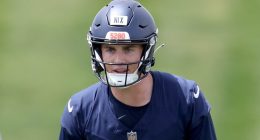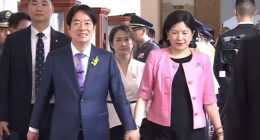
Earvin “Magic” Johnson is one of the greatest basketball players in history, a champion at every level and possessor of a level of athleticism that would have redefined the point guard position had anybody been able to repeat his set of attributes. Off the court, he has been a pioneering businessman, putting his fingerprints on sports franchises, real estate and commercial endeavors, particularly in the Black community. Since his 1991 HIV diagnosis, he has become an integral force in educating the public about a disease that, at the time, was seen as a death sentence.
These points are adequately and persuasively (if you needed persuasion) made in Rick Famuyiwa’s They Call Me Magic, a four-part Apple TV+ documentary that boasts solid archival footage, a good roster of talking heads and, at least for a couple of installments, some stylish spirit.
They Call Me Magic
The Bottom Line Evasive storytelling drains the magic.
But They Call Me Magic has a big, ultimately crushing problem and, unfortunately, that problem is Earvin “Magic” Johnson.
Blessed with a smile that has lit up Tinseltown for four-plus decades, Magic has a personality that’s a big part of why he has remained so beloved. However, as anybody who watched his short-lived talk show The Magic Hour knows, what projected on the hardwood and in board meetings and even in public appearances doesn’t always come through the screen. Magic picks and chooses his moments, and there are times in They Call Me Magic when he’s a lively and specific storyteller. But there are just as many times, especially in the overlong doc’s second half, when he becomes evasive and drained of both enthusiasm and interest.
The first two hours are focused on Johnson’s youth and his basketball career. The opening installment, which leads up to the end of the 1980 NBA Championship, is basically the first season of Winning Time, with many overlapping stories and figures — Larry Bird, Pat Riley, Michael Cooper, Kareem Abdul-Jabbar, Paul Westhead — and it’s worth noting that Jerry West appears in multiple segments without throwing a single trophy through a single window.
Featuring Johnson’s parents, an assortment of his siblings, various teammates, the reporter who gave him his indelible nickname and his future wife Cookie, the basketball-centric chapters are rarely revelatory, but how could they be? The character of “Magic” is one that Earvin Johnson has been playing since the 1970s, and he’s never been shy about self-promotion.
His admiration for his hardworking father and the blue-collar values he instilled are well-documented. He went to high school and was a star and a winner from Day 1. The same in college. And, while he butted heads a little with Abdul-Jabbar in his first preseason, he was a star and a winner from Day 1 in the NBA. It’s a recipe for minimal dramatic conflict. These years are presented with a lot of jazzy “Los Angeles in the 1970s and 1980s” footage and with a soundtrack whose motivation could be described as “Any time somebody mentions a song, we play it.”
The biggest adversity in the first half of the documentary is Johnson’s self-inflicted roller-coaster relationship with Cookie, which included multiple broken engagements and roughly 15 years of mixed messages and dragged-out courtship that Johnson admits was his fault because, well, how could he not? It’s not as charming or even amusing as Famuyiwa thinks, and there was a truly strange decision to interview nearly everybody separately for the entirety of the documentary. I can’t fathom not having Magic and Cookie sitting together for at least some of these stories, but They Call Me Magic avoids friction whenever possible.
That becomes impossible in the second half, which includes Magic’s HIV diagnosis, multiple attempted comebacks and then his business career. It is immediately evident that “Magic,” the consummate showman, was happy to talk about a high school triple-double or various NBA Finals showdowns with the Celtics, but when it comes to more complicated matters, “Earvin,” whom people describe as quieter and more introverted, takes over. Memories of the day of his press conference disclosing his diagnosis are left mostly to other people. Conversations about his health are reduced to total generalities. There’s a vast and rather bizarre gap between the way Johnson describes his pre-marriage social life in the documentary — lots of “going home to his apartment after games” — and the way he discussed that life post-diagnosis.
I’d guess that Johnson simply felt that he’d talked enough in the ’90s about his promiscuity. But if you’re participating in an ostensibly all-encompassing documentary about your life, you don’t get to act like you’re saying new things about your love for Dr. Jerry Buss or stepping up to play center in the 1980 championship clincher, but then clam up about other things. Not if you want to give viewers the impression you’re truly participating. If viewers don’t already know the stories Johnson has previously told, they’ll come away either feeling like Magic was pretty boring or like the truth was pretty boring. If they know the stories but want to hear them with more introspection, there’s nothing here like that.
Things are glossed over. Isiah Thomas and Magic discuss their transition from friendship to rivalry in superficial tones, and if you know some of the really ugly accusations thrown around between them, the white-washing is absurd.
Some things are ignored by Magic, but at least touched on by other people. And silly things! Like, you have Jimmy Kimmel present to refer to The Magic Hour as one of the worst TV shows ever made, but Kimmel doesn’t elaborate on that glib assessment at all, and Magic doesn’t say a word. I’m just using that as an example. I only care a little about The Magic Hour.
Some things aren’t ignored by Magic, but he’s completely upstaged. EJ, Johnson’s son with Cookie, steals the final hour completely by talking animatedly about the pressures of growing up gay as Magic Johnson’s son. Magic, reluctant to give any depth, admits he could have been more supportive and says he’s proud of EJ.
And then some things are completely absent. Sure, you could pretend that Magic Johnson spent the past 20 years exclusively opening movie theaters and Starbucks franchises, and I agree completely that those achievements are more important than his less successful and occasionally embarrassing attempts at coaching and running the Lakers. But those things did happen in real life and aren’t mentioned as even afterthoughts in the documentary. Losing Johnson as a voluble centerpiece might be surmountable if Famuyiwa didn’t simultaneously lose any sense of pacing in what becomes a laundry list of great and important things Magic Johnson did.
There’s a lot of good stuff in They Call Me Magic, but four hours is way too much time to spend on a documentary that’s so blandly opaque in what ought to be its most fascinating sections. Magic Johnson the basketball star, business pioneer and inspiration to millions deserved something with much more flair than Magic Johnson the documentary subject is able to contribute.
Source: Hollywood









